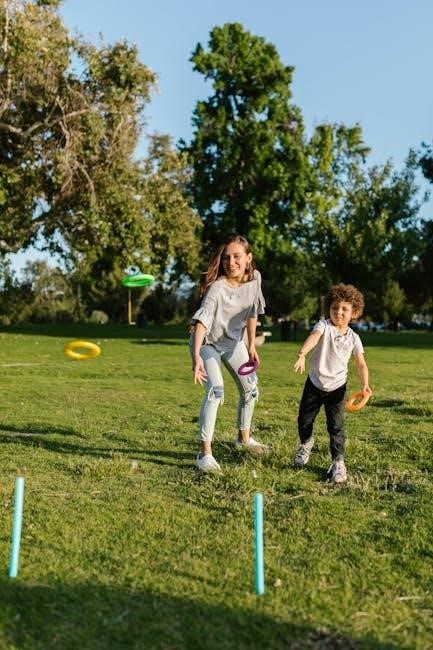Field Day is a vibrant event fostering community, physical activity, and teamwork. It offers diverse games, from classic races to modern twists, ensuring inclusive fun for all participants.
1.1 What is a Field Day?
A Field Day is a fun-filled event that promotes physical activity, teamwork, and community spirit. It typically involves a variety of games and competitions, such as races, relay challenges, and collaborative activities. Designed to be inclusive, Field Day encourages participation from all students, regardless of their athletic abilities. It is often held at the end of the school year, serving as a celebration of student achievements and school culture. Field Day activities are structured to foster camaraderie, sportsmanship, and healthy competition, making it a memorable experience for students, teachers, and families alike. The event is adaptable to different settings, ensuring everyone can join in the excitement.
1.2 Importance of Field Day in Schools
Field Day holds significant value in schools as it fosters community, physical activity, and positive school culture. It provides students with an opportunity to engage in developmentally appropriate competition, promoting teamwork, sportsmanship, and inclusivity. Field Day is often a highly anticipated event, creating lasting memories for students, staff, and families. It encourages physical fitness, social interaction, and collaboration, while also celebrating diversity and unity. Schools use Field Day to build spirit and strengthen relationships, making it a cherished tradition. The event also serves as a platform to promote healthy lifestyles and provide students with a break from academic routines, emphasizing the importance of play and camaraderie in their development.
1.3 Benefits of Participating in Field Day Activities
Participating in Field Day activities offers numerous benefits for students, including improved physical fitness, enhanced teamwork, and the development of sportsmanship. These events promote social interaction, fostering friendships and a sense of belonging. Students also gain life skills such as communication, problem-solving, and adaptability. Field Day activities encourage healthy competition, boosting confidence and resilience. They provide an opportunity for students to step out of their comfort zones and try new challenges, fostering personal growth. Additionally, Field Day helps students develop coordination, agility, and spatial awareness through various games and races. Overall, it creates a positive environment where students can learn, play, and celebrate together, making it a valuable experience for their holistic development.

Classic Field Day Games
Timeless favorites like the three-legged race, tug-of-war, and relay races bring excitement and teamwork, creating unforgettable memories for participants of all ages and skill levels.
2.1 Three-Legged Race
The three-legged race is a timeless favorite that combines teamwork and laughter. Participants pair up, tying their inner legs together with rope or fabric. The challenge lies in synchronizing steps to race efficiently. This activity promotes camaraderie, balance, and coordination. It’s simple to organize, requiring minimal equipment, and can be adapted for different age groups. The race fosters healthy competition while ensuring everyone has fun. Teams must communicate effectively to reach the finish line, making it a great way to build collaboration skills. Its simplicity and inclusivity make it a staple at field days, ensuring all participants can join in the excitement.
2.2 Tug-of-War
Tug-of-war is a classic field day activity that sparks excitement and teamwork. It involves two teams holding opposite ends of a rope, aiming to pull the other side across a designated line. Simple to organize, it requires minimal equipment and fosters camaraderie. Participants develop strength, coordination, and strategy while engaging in healthy competition. The game is accessible to all ages and skill levels, making it a crowd-pleaser. Its straightforward setup allows for quick execution, ensuring everyone can participate. Tug-of-war not only promotes physical fitness but also builds unity and sportsmanship among players. It’s a timeless favorite that guarantees laughter and memorable moments for all involved.
2.3 Relay Races
Relay races are a cornerstone of field day, fostering teamwork, speed, and strategy. Teams are divided into groups, with each member covering a portion of the race. A baton or token is passed between teammates, emphasizing coordination and trust. These races are adaptable, with variations like sprint relays or obstacle courses to suit different ages and abilities. They promote physical fitness, agility, and camaraderie while encouraging healthy competition. Relay races are a timeless favorite, offering excitement for participants and spectators alike. Their structured yet dynamic nature makes them a highlight of any field day event, ensuring everyone leaves with unforgettable memories and a sense of accomplishment.

Modern Twists on Traditional Field Day Games
Modern twists bring creativity to classic games, offering fresh excitement. Life-size board games and video game-inspired activities create engaging, interactive experiences for all participants, fostering fun and innovation.

3.1 Life-Size Board Games
Life-size board games bring classic favorites to life, offering a fresh twist on traditional Field Day activities. Games like Chutes and Ladders or Giant Jenga are scaled up for group play, fostering teamwork and laughter. Participants navigate large-scale boards, rolling giant dice or solving puzzles to progress. These activities encourage physical movement, problem-solving, and collaboration, making them ideal for diverse age groups and abilities. They also provide a unique way to engage students creatively, blending nostalgia with active play. Life-size board games are a modern, inclusive addition to Field Day, ensuring everyone can participate and enjoy the fun. They add a dynamic, interactive element to the event, making it memorable for all involved.
3.2 Video Game-Inspired Activities
Video game-inspired activities bring digital fun to life, creating engaging and interactive Field Day experiences. Games like a life-size version of Galaga, transformed into a dodgeball-style competition, or a Mario Kart-inspired obstacle course, add a modern twist. These activities encourage teamwork, strategy, and physical movement, appealing to students who enjoy gaming. They also foster creativity and problem-solving skills, as participants adapt game mechanics to real-world challenges. By incorporating elements from popular video games, Field Day becomes more relatable and exciting for tech-savvy students. These activities bridge the gap between virtual and physical play, offering a unique way to promote active learning and collaboration. They are perfect for schools looking to innovate and captivate students with familiar, fun concepts.
Inclusive Field Day Activities
Inclusive Field Day ensures all students participate, regardless of abilities. Adaptive games and Unified events promote equality, teamwork, and fun, making everyone feel valued and engaged.
4.1 Unified Field Day
Unified Field Day is a celebration of inclusion, bringing together students of all abilities. It emphasizes teamwork, sportsmanship, and fun, creating a supportive environment where everyone thrives. Activities are designed to ensure participation from all students, fostering mutual respect and camaraderie. Special needs students often take center stage, paired with peers who assist and cheer them on. Events like relay races and tug-of-war are adapted to be accessible, ensuring everyone can contribute. This approach not only promotes physical activity but also strengthens social bonds and school spirit. Unified Field Day is a powerful way to build an inclusive community, celebrating diversity and the joy of shared experiences.
4.2 Adaptive Games for Special Needs Students
Adaptive games are tailored to ensure special needs students can fully participate in Field Day. These activities focus on accessibility and inclusivity, often using modified rules or equipment. For example, wheelchair races or seated versions of classic games like balloon volleyball are popular. Visual or auditory cues may be added to support students with sensory needs. Adaptive games emphasize fun and engagement, allowing all participants to contribute meaningfully. They foster a sense of belonging and encourage teamwork, while celebrating diverse abilities. By prioritizing accessibility, these games create a welcoming environment where every student can thrive and enjoy the spirit of Field Day.

Indoor Field Day Activities
Indoor Field Day offers creative alternatives for limited spaces, featuring games like balloon volleyball and hallway relays. These activities ensure fun and engagement regardless of weather conditions.
5.1 Alternative Games for Limited Space
For schools with limited outdoor space, indoor Field Day activities offer a fun and engaging solution. Games like balloon volleyball, hallway relays, and hula hoop contests are perfect for confined areas. Balloon volleyball can be played in a gym or hallway using a net or even a line on the floor. Hallway relays involve simple tasks like jumping jacks or crawling, requiring minimal setup. Additionally, activities like Simon Says or indoor obstacle courses can be adapted to fit any space. These games promote physical fitness, teamwork, and laughter, ensuring everyone can participate regardless of space constraints. They are ideal for maintaining the spirit of Field Day indoors.
5.2 Organizing Indoor Competitions

Organizing indoor competitions for Field Day requires creativity and careful planning. Start by selecting activities that fit the available space, such as balloon volleyball, indoor relays, or hula hoop contests. Divide students into teams to foster teamwork and healthy competition. Use cones or markers to define game areas and ensure safety. Assign volunteers or staff to supervise and keep track of scores. Incorporate music and announcements to maintain energy and excitement. Consider time limits for each activity to ensure all games are completed. Provide clear instructions and demonstrate each game to avoid confusion. Finally, award participation certificates or small prizes to celebrate everyone’s effort. This approach ensures a fun and engaging indoor Field Day experience.

Organizing a Successful Field Day
Organizing a successful Field Day involves careful planning, safety measures, and inclusive activities. Ensure all participants have fun while staying engaged and safe throughout the event.
6.1 Tips for Preparation
Effective preparation is key to a successful Field Day. Start by creating a detailed schedule and assigning roles to volunteers and staff. Ensure all equipment is safe and ready. Conduct a trial run of activities to identify potential issues. Communicate clearly with participants, parents, and volunteers about the plan. Prepare for varying weather conditions with indoor alternatives. Organize first aid kits and emergency plans. Promote inclusivity by adapting games for all abilities. Finally, brief everyone on safety protocols and encourage teamwork and sportsmanship. Proper preparation ensures a fun, organized, and memorable event for all involved.
6.2 Safety Measures and Equipment
Safety is paramount during Field Day. Ensure all equipment is sturdy, age-appropriate, and free from hazards. Use cones, hurdles, and soft obstacles to create boundaries. Provide first aid kits and have trained staff on site. Conduct a safety briefing for participants, emphasizing proper techniques and rules. Supervise all activities closely, especially for younger students. Ensure proper hydration and shade options are available. Check weather conditions beforehand and have a contingency plan for extreme heat or rain. Use protective gear where necessary, such as mats for relay races. Regularly inspect equipment for damage and ensure it is securely set up. Prioritizing safety ensures a fun and injury-free experience for everyone involved.
Health and Safety Considerations
Ensure a safe environment with proper equipment checks, trained staff, and clear guidelines. Prioritize hydration, shade, and weather monitoring to protect participants and create a secure, enjoyable experience.

7.1 First Aid and Emergency Preparedness
First aid and emergency preparedness are crucial for a safe Field Day. Ensure a trained staff member or medical professional is present with a well-stocked first aid kit. All participants should have emergency contact information readily available. Establish a clear plan for handling injuries, including minor scrapes and more severe incidents. Preventative measures, such as warm-ups and proper equipment checks, can reduce the risk of accidents. Designate a shaded area for heat-related issues and have a communication plan in place for emergencies. Regular drills and staff training ensure quick, effective responses. A comprehensive emergency plan, including weather-related protocols, helps maintain a secure environment for all participants.
7.2 Weather-Related Safety Tips

Weather conditions play a significant role in ensuring a safe Field Day. Always monitor forecasts and have a backup plan for indoor activities if severe weather is expected. Ensure participants stay hydrated, especially in high temperatures, by providing ample water breaks. Be prepared for heat-related issues by designating shaded areas for rest. In case of poor air quality, consider postponing outdoor activities. Establish a clear communication plan to quickly respond to weather changes, such as lightning or heavy rain. Train staff to recognize and address weather-related risks promptly. Including weather safety in emergency drills ensures everyone is prepared for unexpected conditions, keeping the event enjoyable and secure for all participants.
Community and Parental Involvement
Engaging parents and volunteers enhances Field Day’s success, fostering a sense of community. Their support in organizing activities and cheering students builds school spirit and shared joy.
8.1 Engaging Parents and Volunteers
Engaging parents and volunteers is crucial for a successful Field Day. Their involvement fosters a sense of community and shared responsibility, creating a positive environment for students. Parents can assist with event planning, activity coordination, and supervision, ensuring everything runs smoothly; Volunteers often bring unique skills, such as organizing games or providing logistical support. By involving parents and volunteers, schools build stronger connections with families and enhance the overall experience. Their contributions not only lighten the workload for staff but also demonstrate the value of teamwork and collaboration. This collective effort makes Field Day a memorable and enjoyable event for everyone involved.
8.2 Building School Spirit Through Field Day
Field Day is a vibrant event that fosters school spirit by bringing students, teachers, and staff together in a fun, competitive environment. It encourages teamwork, camaraderie, and shared pride, creating lasting memories. Students often represent their grades or teams, wearing matching colors and cheering for one another, which strengthens their sense of belonging. The event also promotes unity by celebrating diverse abilities and backgrounds through inclusive activities. Field Day becomes a platform to showcase school values, such as sportsmanship and collaboration, while building a positive and supportive community. This collective celebration leaves a lasting impact, making it a cherished tradition that enhances school spirit year after year.

Resources and References
Discover comprehensive Field Day Activity Guides and PDFs offering creative ideas, tips, and equipment suggestions to ensure a successful and engaging event for all participants.
9.1 Field Day Activity Guides and PDFs
Field Day activity guides and PDFs are essential resources for organizing a successful event. These documents provide detailed ideas for games, tips for preparation, and equipment lists. Many guides include creative activities like life-size board games and video game-inspired challenges, ensuring fun for all ages. They also emphasize inclusivity, offering adaptive games for special needs students. PDFs often feature step-by-step instructions, making it easy to plan and execute events. Additionally, these resources highlight the importance of safety, teamwork, and sportsmanship. By leveraging these guides, educators and organizers can create engaging, memorable experiences for students and communities alike, fostering physical activity and school spirit.
9.2 Recommended Equipment and Supplies
Organizing a successful Field Day requires the right equipment and supplies. Essential items include cones, ropes, beanbags, hurdles, and balance beams for setting up race tracks and obstacle courses. Balls, frisbees, and tug-of-war ropes are perfect for classic games. For inclusive activities, adaptive tools like larger targets or lightweight javelins ensure participation for all. Water bottles, first aid kits, and sunshades are crucial for safety and hydration. Many Field Day PDF guides provide detailed lists, emphasizing the importance of durable, weather-appropriate materials. Proper equipment ensures smooth execution, safety, and maximum fun for participants. By preparing these supplies, organizers can create an engaging and memorable experience for everyone involved.
Field Day is a celebration of physical activity, teamwork, and community spirit. It offers a platform for students to develop essential skills like sportsmanship and collaboration while fostering inclusivity. With a mix of classic and modern games, Field Day ensures fun for all participants. Proper preparation, safety measures, and engagement from parents and volunteers are key to its success. By promoting active play and unity, Field Day creates lasting memories and strengthens school culture. Whether indoors or outdoors, it remains a cherished event that highlights the importance of physical education and togetherness. Its impact extends beyond the day itself, inspiring students to embrace health and teamwork year-round.
